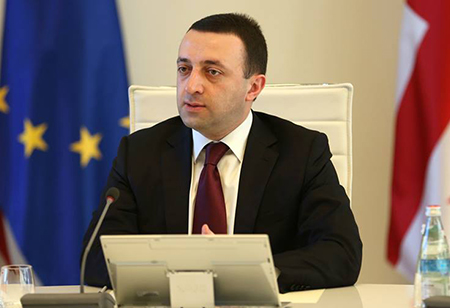PM Garibashvili reviews depreciation of Georgia's national currency

Georgia’s Prime Minister Irakli Garibashvili has commented on the continuing devaluation of Georgia’s national currency, the Lari, against the US dollar, noting this was a "reflection of the ongoing processes in the region”.
"We have to continue economic growth and we will do our best for this,” Garibashvili said.
Yesterday the National Bank of Georgia (NBG) sold $40 million USD at a foreign currency auction as the Lari continued to dedepreciate the Lari fell to 16-year low against the US dollar on April 28.
The Lari fell by slightly over 1 percent on Tuesday and was trading at 2.3087 per 1 US dollar – its lowest level since March 1999.
Since early November 2014, the Lari has lost 31.6 percent of its value against the US dollar. Georgia's national currency started to depreciate about six months ago.
The selling of $40 million USD on Tuesday was the Georgian central bank’s fifth intervention this year after selling a total of $160 million USD on four separate occasions ($40 million each time) in February and April.
Garibashvili told journalists on April 28 that the country's economy was growing thanks was the hard work and effort by Georgian Government ministers but more still needed to be done.
The economic growth rate in Georgia amounted 3.1 percent in the first quarter of 2015 while it reached 4.1 percent in March, announced Irakli Garibashvili, adding that "economic growth was achieved thanks to the effective ministers’ effort”.
"The Georgian economy experienced 4.1 percent growth in March, which is a very serious number especially if we take into account the circumstances in which Georgia, the whole of Europe and the region are facing,” Garibashvili said.
"A very impressive result is 3.1 percent economic growth only in Q1. Look at the situation in the region and you will see that Georgia is an exception [in terms of economic growth rate],” he added.
In mid-April Fitch Ratings revised its Outlook on Georgia from ‘Positive’ to ‘Stable’ and affirmed the country’s sovereign rating at BB-.
Fitch noted there were several reasons for the revision of Georgia’s Outlook, one of which was the impact of the devaluation of the currency on Georgian trade and remittances.
Fitch said Georgia had experienced "multiple external shocks” following the drop in oil prices and sanctions-induced downturn in Russia, which had spilled over to surrounding CIS (Armenia, Azerbaijan, Kazakhstan, Kyrgyzstan, Moldova, Turkmenistan, Tajikistan and Uzbekistan) economies. This had triggered a wave of trading partner currency devaluations.
These developments have had a highly adverse impact on Georgian trade and remittances: exports have fallen sharply (by 27 percent in Q1 2015), while remittances were down about 23 percent.
 Tweet
Tweet  Share
Share


